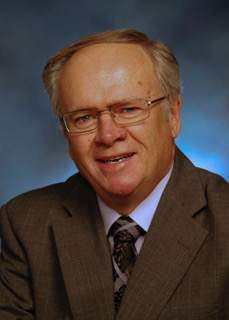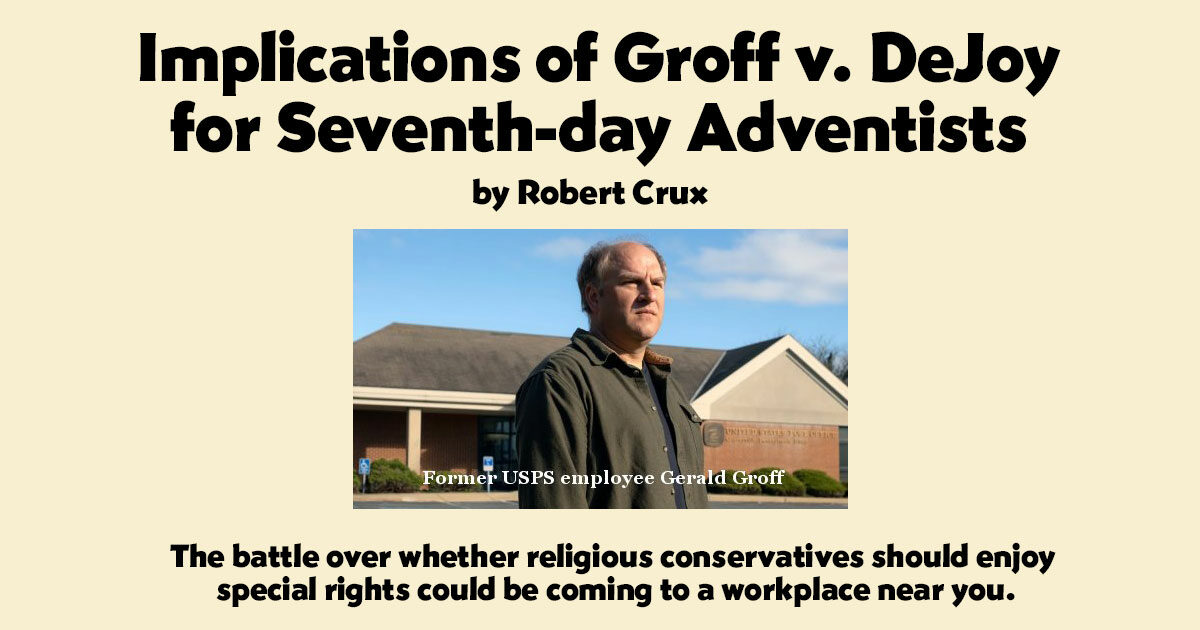Should Conservative Religious Employees Get Special Privileges?
by Robert Crux | 9 May 2023 |
The battle over whether religious conservatives should enjoy special rights could be coming to a workplace near you. The Groff v, DeJoy case could give religious conservatives unprecedented new power to dictate how their workplaces should operate. Will the Supreme Court of the United States (SCOTUS) show a willingness to accommodate and interpret the law in ways that benefit Christian-identified conservatives? Should the Supreme Court rule in favor of Groff, will this disrupt the workplace and place far too many burdens on non-religious employees?
Background
When Gerald Groff started his job search in Lancaster County, Pennsylvania, in 2012, he was seeking a position that would allow him to honor the Sabbath on Sundays. Knowing that the U.S. Post Office (USPS) was closed on Sundays, he applied and was hired as a postal carrier. However, when the postal service began delivering packages on Sundays for Amazon in 2015, Groff informed his supervisor that he would not work his scheduled Sunday shifts because of his religious beliefs. The postmaster granted his request, and Groff agreed to work extra shifts during the week. He even switched posts and accepted a lower position to be able to abide by his faith.
The postmaster sought volunteers to replace Groff on the Sunday schedule, but often was unable to do so. Groff faced escalating discipline when he refused to report to work on scheduled Sundays, and, believing he would soon be terminated, eventually resigned in 2019 and sued the USPS for failing to accommodate him under Title VII of the Civil Rights Act of 1964. Groff did his best to accommodate the USPS, but the USPS refused to accommodate him.
Title VII of the 1964 Civil Rights Act requires employers to show that an employee’s request for religious accommodations would create an “undue hardship” in order to deny it. The Supreme Court undercut this provision in 1997 when it ruled in Trans World Airlines v. Hardison that the “undue hardship” term means that employers only need to prove they face more than a “de minimis” (very minimal) cost to deny a religious accommodation.
The Hardison Decision
Sanya Mansoor writes, “The low standard established in Hardison means employers have often scored legal victories in federal court after denying employees’ religious accommodations on issues ranging from physical appearance and dress to Ramadan fasting—and on other requests concerning the Sabbath. A court ruled in a 1992 case that a Seventh-day Adventist working at the Chrysler Corporation could not have his schedule accommodated to observe the Sabbath because it would have cost the company about $1,500 a year. A court upheld denying Sabbath accommodations for Orthodox Jews in a 2006 case involving Quest Diagnostics because it could “negatively affect [the] morale of employees” without the same religious needs. In 2018, a court upheld Walgreens’ decision to fire a Black Seventh-day Adventist employee who worked at a call center and refused to work on Sabbath.”
Where the Hardison decision did too little to protect religious employees, the Groff ruling could easily err in the other direction. Currently, this Supreme Court is made up of six conservative justices and three liberals. This court has been generally open to claims of religious discrimination by Christians. A Supreme Court verdict in favor of Groff could clarify the standard employers need to meet to deny religious accommodations throughout the country, altering and potentially strengthening protections for all religious workers going forward. However, a Supreme Court that frequently demands that religious conservatives receive extraordinary accommodations has the potential to create more confusion for non-religious employers and an abundance of future litigation for the courts to handle.
The Groff case asks the Supreme Court to reconsider the appropriate standard of undue hardship that an employer must demonstrate before it may be excused from its duty to reasonably accommodate an employee’s religious belief or practice under Title VII of the Civil Rights Act of 1964. It also asks the Supreme Court whether Title VII permits employers to demonstrate undue hardship solely by showing that any accommodation would burden other employees.
The Supreme Court of the United States heard oral argument in the case on April 18, 2023. A decision is anticipated in June 2023.
Implications for Adventist Workers
At first glance, a SCOTUS ruling in favor of Groff would appear to be a positive development for those Seventh-day Adventists who are part of the non-professional/blue collar workforce. The current standard disproportionately affects minority faiths, people of color, and low-income wage earners who struggle to obtain many types of accommodation in the workplace. Other implications regarding a favorable Groff ruling may be more subtle but noteworthy for Adventist religious workers to consider.
- What is the potential benefit for Adventist workers? Joshua McDaniel says that non-professional employees “currently face a difficult choice between their livelihoods and religion, and a favorable decision in Groff adopting a more robust interpretation of the Title VII’s ‘undue hardship’ test would help to ease that burden and give workers a fighting chance to prevail on their religious discrimination claims.”
- Could every workplace turn into a religious battleground? Will a SCOTUS ruling in favor of Groff be expansive or limiting in its interpretation? Will a SCOTUS ruling give special rights to conservative evangelical Christians whose political power and influence argues for a Sunday Sabbath work exemption for its members? Could this further restrict Adventists, Muslims, and other religious groups whose Sabbath/day of worship is different?
- Will a favorable Groff ruling reflect a balance between the two important values of religious liberty and the rights of American businesses to thrive? This becomes important to employers, including Adventist employers.
- Is there an ethical dilemma that arises for Adventists and other religious workers should a favorable Groff ruling disrupt the workplace and place far too many burdens on non-religious employees? Could non-religious employees claim undue hardship?
- The Seventh-day Adventist denomination is supporting the plaintiff in this case.
Summary
The Groff v. DeJoy case could prove to be a messy, chaotic case about religion in the workplace. It could potentially revolutionize the balance of power between workers and their employers. Finally, the Groff ruling has the ability to expand or hinder the religious liberty of Adventists and other minority religious groups because it promises to be another crucial test between principled jurisprudence and partisan politics.
 Robert D. Crux, Ed.S, worked as a teacher, principal, and superintendent of schools over a period of 35 years in Adventist education before retiring in 2016 to Lawton, Michigan, where he enjoys writing, reading, biking, model railroading, and, most of all, his grandchildren.
Robert D. Crux, Ed.S, worked as a teacher, principal, and superintendent of schools over a period of 35 years in Adventist education before retiring in 2016 to Lawton, Michigan, where he enjoys writing, reading, biking, model railroading, and, most of all, his grandchildren.




